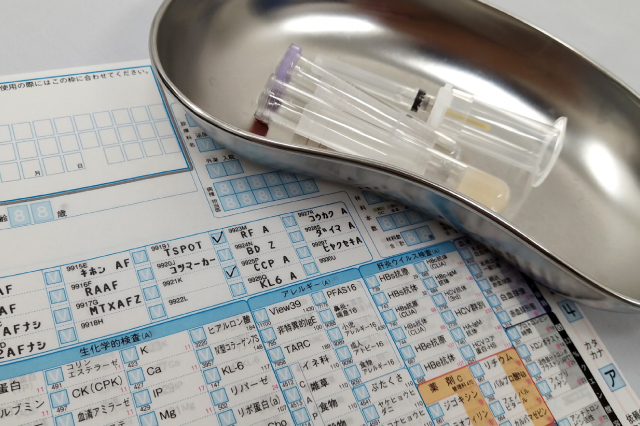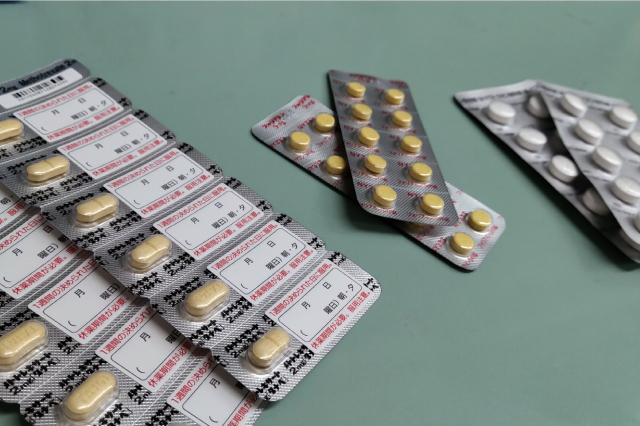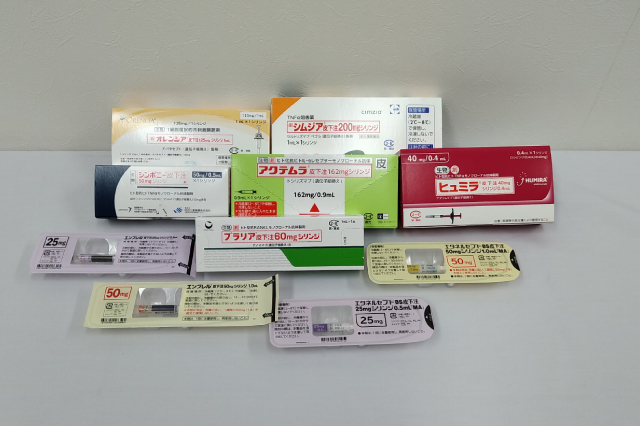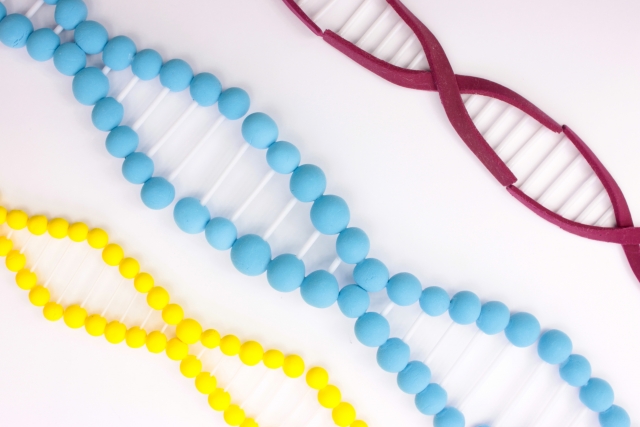About anti-CCP antibody
Anti-CCP antibody is one of the most important blood tests in diagnosing and treating rheumatism.
Anti-CCP antibodies are much more sensitive than conventional rheumatoid factor tests and are the most important blood test that can accurately predict the onset of rheumatoid arthritis.
Anti-CCP Facts:
- It is known that patients who develop rheumatoid arthritis become anti-CCP antibody positive well before the onset of the disease.
- In the case of RF (rheumatoid factor: antibodies related to rheumatoid arthritis and other collagen diseases) positive rheumatoid arthritis and anti-CCP antibody positive rheumatoid arthritis, if the swelling of the joints is not removed as soon as possible through proactive treatment, the deformity will often progress in a short period of time.
Therefore, if you are symptomatic and anti-CCP antibody positive, you need to be treated early to prevent the deformity from progressing.
Anti-CCP antibody positivity and the need for early treatment
Development of rheumatism within a few years if anti-CCP antibody positive
If you happen to test positive for anti-CCP antibodies in a physical examination, there is an over 80% chance that you will develop rheumatoid arthritis within a few years (a few months to 5 years). It can be used to predict the onset of rheumatoid arthritis because it becomes positive at a stage when there are almost no symptoms. If you are worried about inheritance, for example, if you have several mothers or siblings with rheumatoid arthritis, you may want to check it out.
Anti-CCP antibody positive cases are called "genuine rheumatism" and anti-CCP antibody negative cases are called, for lack of a better word, "halfway rheumatism" or rheumatic constitution.
In "rheumatoid arthritis in the middle," there is pain but little progress in deformity.
On the other hand, in the case of RF-positive and anti-CCP antibody-positive rheumatoid arthritis, if the swelling of the joints is not removed as soon as possible through pre-emptive and proactive treatment, the deformity will often progress rapidly.
The current treatment for rheumatism cannot change the underlying cause, i.e., the constitution and genes that predispose to rheumatism.
Even if the treatment is successful and the pain disappears, those who are positive for anti-CCP antibodies usually remain positive for a long time, usually more than 10 years or 20 years.
Therefore, even if the patient is brought into remission, symptoms often appear when the medication is gradually reduced.
Guideline for starting treatment
It is also known that if anti-CCP antibody positive patients develop rheumatoid arthritis, they are likely to develop severe joint deformities within 1-3 years if they are not treated early and adequately.
The destruction of joints (bone destruction) caused by rheumatoid arthritis was conventionally thought to be a gradual process, but it has been found that it actually progresses rapidly in the first two years.
Therefore, it is important for those with high anti-CCP antibodies to be treated aggressively and proactively.
In the absence of symptoms
We do not give drug therapy to patients with positive anti-CCP antibodies who are completely asymptomatic.
There are classification criteria for rheumatoid arthritis that are used worldwide (ACR/EULAR 2010 criteria).
Most specialists use this as a guide to start treatment. Since it is a very well thought out criteria, it is never too late to start treatment as soon as the patient meets this criteria.
However, even if CRP and other parameters are normal, synovitis lesions in the cervical vertebrae and early inflammatory findings that can only be found by ultrasound and MRI scans are often found.
It is important to thoroughly examine and evaluate whether rheumatism has really not started in order not to miss the appropriate window to start treatment. In many cases, even after starting treatment, if the inflammation continues with ineffective medication, the destruction of the joints will progress.
Please consult a rheumatologist once.
Are anti-CCP antibody levels proportional to the severity of rheumatoid arthritis?
The number of anti-CCP antibodies is not directly proportional to the severity of the rheumatism.
For example, some of our patients have high anti-CCP antibodies of over 1,000.
Some patients have antibodies up to 5,000.
An anti-CCP antibody of 500, for example, is not 10 times worse than that of a person with 50.
However, it is safe to say that a high number is roughly proportional to the momentum (rather than the severity) of the rheumatic disease.
If you compare the average of those who are positive for anti-CCP antibodies around 4.5-50 and those who are positive for antibodies above 100, there is no doubt that the rheumatoid arthritis is stronger in the group that is high above 100.
The higher the number, the longer the treatment period tends to be (5 to 10 years or more).
At our hospital, when the rheumatoid arthritis has reached a stable stage and is almost in remission, we consider whether we can reduce the medication. At that time, we measure anti-CCP antibodies to help us make a decision. (About once every 1-3 years)
If the anti-CCP antibody level is significantly lower than the level at the beginning of treatment, we can reduce the medication, and if it is not much lower, we can reduce the medication carefully.
Will the anti-CCP antibody levels go down?
As the medication works and the rheumatism gets better, the anti-CCP antibody numbers often go down.
In fact, there are patients who have achieved drug-free remission without the need for biologics or MTX because their joint symptoms have improved and their anti-CCP antibody levels have dropped.
However, since anti-CCP antibodies express a part of the rheumatic process that is quite close to the root of the disease, they are not necessarily proportional to the actual symptoms that appear on the surface, and there are cases where the numbers continue to rise even when the patient is getting better. Therefore, it is not necessarily useful in determining the effectiveness of rheumatism treatment.
Reference citation
Is Rheumatoid Arthritis Relief Possible? -Ferdinand C. Breedveld APLAR 2010
Evidence literature
#1 Berglin E,Johansson T,Sundin U,et al:Radiological outcome in rheumatoid arthritis is predicted by presence of antibodiesagainst cyclic citrullinated peptide before and at disease onset,and by IgA-RF at disease onset.―
http://ard.bmj.com/content/65/4/453.short
#2 Syverrsen SW,Gaarder PI,Gokk GL,et al:High anti-CCP levels and an algorithm of four variables predict radiographic progression in patients with rheumatoid arthritis: results from a 10-year longitudinal study―
http://ard.bmj.com/content/early/2007/05/25/ard.2006.068247.abstract
Alessandri C,Bombardieri M,Papa N,et al:Decrease of anti-cyclic citrullinated peptide antibodies and rheumatoid factor following anti-TNFα therapy (infliximab) in rheumatoid arthritis is associated with clinical improvement―
http://ard.bmj.com/content/63/10/1218.abstract
Caramaschi P,Biasi D,Tonolli E,et al:Antibodies against cyclic citrullinated peptides in patients affected by rheumatoid arthritis before and after infliximab treatment―
https://www.ncbi.nlm.nih.gov/pubmed/15726373
De Rycke L,Verthlst X,Kruithof E,et al:Rheumatoid factor, but not anti-cyclic citrullinated peptide antibodies, is modulated by infliximab treatment in rheumatoid arthritis―
http://ard.bmj.com/content/64/2/299.abstract
van Dongen H et al.Arthritis Rheum 2007;56(5): 1424-1432 Efficacy of Methotrexate Treatment in Patients With ProbableRheumatoid Arthritis
http://onlinelibrary.wiley.com/doi/10.1002/art.22525/pdf









